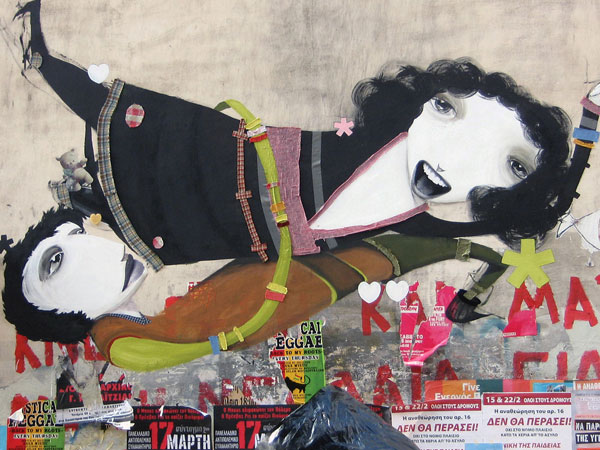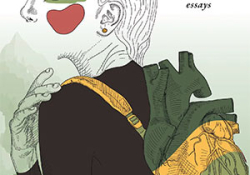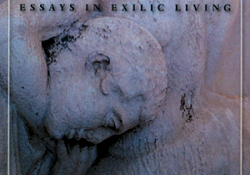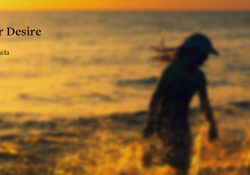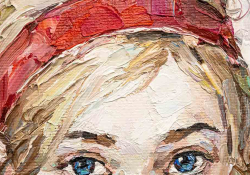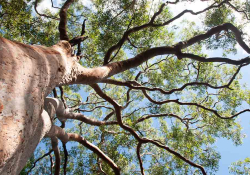Ruin
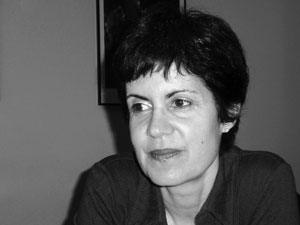
And then what you wanted was salt, . . . but you could not turn to look. —Cecilia Woloch, “Salt”
My parents were deliberate about escaping their place of origin and deliberately "cast the black rock," as the Greek saying goes for not looking back.
What happens when anyone looks back? You could turn to salt like Lot's wife, who could not resist looking back on Sodom, her city. But I look up salt and find its multiple references in the Old Testament, a condiment and a food preserver, also rubbed on newborns to disinfect and ensure good health; also a metaphor for barrenness and desolation. The tale of Lot's wife warns of what can happen when grief overwhelms: it disintegrates the self, leaving salt remains. I have a memory of a rare time our family visited McKeesport, Pennsylvania, where my mother was born, a place she rarely spoke about. We were passing a patch of trees and houses that looked worse for wear but were nevertheless houses with their little bits of yard. She took a quick intake of breath.
“Oh,” she said, and under her breath, “I haven’t thought of this place in so many years. . . .” It stayed with me because she shivered and looked spooked.
Another memory: my parents dropped my two brothers and me off to stay with my Italian grandmother in McKeesport for a week while they traveled. We were ten, seven, and five. There was a donut factory (the name escapes me) that made special McKeesport donuts that were moved along on a factory belt in their shiny sugar glazes. The warm dough scents of the freshly baked donuts wafted through the entire block, and had us lining up to sneak off with as many as we could eat or grab.
My brothers and I never learned Italian, which we rarely heard anyway, but we could have learned Greek. Yet my Greek father insisted on speaking to us in English. Greek was the language of the country my father was forever escaping. One of the many who had fought in the Greek Resistance against the Nazi occupation during World War II, my father was viewed, like all on the left, at the end of the war as a threat because of the movement's Communist backing. To escape, my father turned his back on everything past and looked firmly toward New World beginnings where everything was in English.
Like Greece during the war, the mysterious house in McKeesport was never mentioned, and so it grew into narrative: the place where my mother's large immigrant Italian family lived; the place they were moved out of during the Depression years when she was a young girl. She had such a fear of losing things, yet never settled in any one house for more than a handful of years. I, on the other hand, because of our constant moves, came to Greece to settle where my grandparents lived, in the house my grandfather had built.
There is this passage from Czesław Miłosz's Native Realm:
Unless we can relate it to ourselves personally, history will always be more or less an abstraction and its content the clash of impersonal forces and ideas. Although generalizations are necessary to order this vast, chaotic material, they kill the individual detail that tends to stray from the schema. . . . Afterwards all that remains of entire centuries is a kind of popular digest.
Wherever he found himself in his long life and many travels, Milosz carried the scents and seasons and characters of his Lithuanian childhood with him: "If I mention my ancestors, it is because they are a source of strength to me." In this way, history for Milosz was never in danger of disintegrating into mere debris.
Athens, the city I have lived in for the past twenty years, is full of excavated historical artifacts (handsomely displayed in the city's metro stations and museums) next to buildings in all states of neglect and renovation. There are graffiti surfaces and newly painted Minoan ochres on neoclassical walls, as well as ancient columns used to hold up political banners and the latest strike announcements. Athens can look like a traffic jam of historical crossroads with those going in different directions demanding their right of way.
*
On the road to the Eleftherios Venizelos airport, there is a constantly changing billboard that has read, by turns: These have replaced earlier versions of the same, which used "myth" rather than "story" in the ads, such as: The awkward syntax and constant rewording on these billboard posters sponsored by the ministry of tourism make the slogans poignant and embarrassing. But when I mention this in class to my mostly Greek students, I am surprised to see that the majority of them approve of the ads, describing them as inviting and colorful, even if the woman in the straw hat next to a turquoise sea looks more like she is in the Bahamas than anywhere in Greece. My students are more than eager to see their country presented in inviting graffiti-less ways, with the sea and ancient columns part of the cultural backdrop that appeals to how a visitor might view the country. It is important to them, I realize, to present a cultural landscape that does not include the grit and graffiti, the discordant voices that ruin the splendor of the ruins.
is a nicely kitsch way of saying Greece (or perhaps the ministry of tourism) is happy to invite mythologizing narratives. Mythologia, from logia (words), does after all begin in Greece, a culture since antiquity building itself out of its ruins, and also, as is often the case, making itself up in the process. The Acropolis, spectacular ruin that it is, symbolizes one of the strongest of these narratives to Greeks and non-Greeks alike, the myth of unbroken, or unruined, continuity with Greece's Golden Age past.
My mother and father were stunned that I chose to live and stay in Greece. "Why would you go back there?" they often asked, which was incongruous, since it was not "back" for me who had never lived in and left Greece. But perhaps they meant back as opposed to forward, as in backward to a world where people had less modern lives. Or back to ghosts sure to complicate the present.
My father, who keeps silent on topics related to Greece, surprised me with laconic responses to my e-mails during the 2004 Olympics, and then more recently when I forwarded pieces on the eurocrisis and Greece's much publicized debt. Sometimes it was no more than a sentence or two: "This is disturbing indeed," or "Very interesting and unsettling." Was I trying to give memory back to a bereft parent? He could not return to Greece for years. And many of his leftist friends who were not smuggled out of the country at the outset of the Greek civil war found themselves exiled and imprisoned on barren islands like Makronisos and Yaros. When he married my mother in his early twenties, he sent her alone to meet his parents in Athens. She was a young woman who had managed to escape her immigrant neighborhood in McKeesport because her mother saved dollars in a tin for her to become an airline stewardess. When my father now visits Greece, he meets up with the handful of surviving friends he so long ago joined with in the mountains to fight the Nazi Germans. And I imagine they speak of things they have never shared beyond their slowly dwindling circle.
*
There's a man at the traffic lights on Vas. Sofias, one of the main thoroughfares in Athens; he is one of the many Pakistani refugees who gather there to beg. What's different about him is that he smiles every time he points to his blind eye, a gouged, flesh-scarred lid that no longer opens, and nods as he opens his palm for money.
He is asking me to focus on his eye, and I resent this; he wants me to understand this as what defines him. Not that he is tall, that his sandalwood skin glistens, that he is somewhere between thirty and forty, that his hand, when I drop coins into it, is rough-palmed, but that he is ruined by this eye. Milosz writes: "One should appreciate, after all, the advantages of one's origin. Its worth lies in the power it gives one to detach oneself from the present moment." I am not able to detach myself from the blind-eyed Pakistani when I see him at the traffic lights.
Another refusal to detach: the entire upper floor of the New Acropolis Museum dramatizes the missing Parthenon marbles by filling in their absence with white plaster moldings. The present moment is on display as traumatized, and the meeting with origins, confrontational. One must ask, What happened to the original friezes? What happened to those headless soldiers? Those gouged faces?
My father left Greece with no idea if he would ever return or see his parents, or his country, again. My mother to this day continues to ask, "When are you coming home?"
"Home?" I say. "I think, after twenty years, I am home." She is still surprised that I might consider Greece home. What, I find myself thinking, is finally home for her in those rarely voiced references to her McKeesport childhood? All the homes she inhabited in her many moves away from her town of steel mills never got her beyond the house that spooked her. She once described a dream of walking through a series of homes "more beautiful than the next" that she decorated lavishly, though none of them ever felt like it was hers. She said she woke up in tears.
My Italian grandmother spent her entire life in McKeesport though the neighborhood with the donut factory gradually changed. The last time we visited, the brick walls were shabby and spray-painted, and the space in the back where we snuck away donuts, boarded up. My grandmother was in her nineties, on her tiny porch when she said, "The good Lord's left me here a little longer because he needs me." She described how she had saved a young girl, walking home alone, from a group of guys in a car. She told the girl to come in off the road and yelled at the guys like she was swatting mosquitoes.
In the midst of her ruined neighborhood my grandmother, like Milosz, carried rootedness within herself. My parents, on the other hand, spent their lives seeking the unruined future. My mother went to airline school and worked for a time as a stewardess on TWA's domestic flights. She met my father when he lived with other Greeks "just off the boat"—her euphemism for my father's heavily accented English. All that my mother ever really wanted was to fly as far as she could from McKeesport, so she agreed to go to Vietnam in the late 1950s with my father. Southeast Asia provided my parents with an opportunity to escape their pasts, and my father a chance to make a career of selling engineering parts.
I hardly remember anything of Saigon, where my brothers and I were born. There was a cat I loved, and nuns in a French Catholic school I attended. When I ask my mother about Saigon, she remembers the rhythmic swishing of straw brooms along the streets. I was eight when we left.
Perhaps anyone who says they will tell you a whole story is already in the midst of a fabrication. Maybe there are no whole stories unless we shape them as such, adding and subtracting accordingly to reflect another fabrication.
*
On the rare occasion when my father speaks of his time in the Resistance, he inevitably says something about the self-interest of all ideologies; the left, he says, had manipulated those like him who had gone in all sincerity to fight and, if need be, die for their country.
"Eighty percent of the Greek population was in the Resistance," he would say, "the other 20 percent were Royalists who supported the king exiled in Cairo. Churchill supported the king." He would then tell me the story was complicated. Sometimes I could put the pieces together. I understood it was Churchill who had initiated the tensions that fueled the civil war. ("Just read his memoirs," my father said. "He says in no uncertain terms to do whatever it takes to stop Stalin from controlling Greece.") That I live in Greece forces my father to look back on ruins.
On a friend's veranda this summer, we joked about how we would reword the ads on the billboards along the road to the airport: discover your myth: discover your debt was one thought, or more to the point, discover your myth. invest your debt. We had learned that Goldman Sachs, for example, had introduced the CDS (credit default swaps) to an all-too-willing government who didn't want the debt made public. A recent Vanity Fair feature on Greece uses Enron as an analogy for one of Greece's more ingenious scandals involving the monks of the Vatopaidi monastery: "If you are kindly disposed to these monks, Father Arsenios is the trusted assistant who makes possible the miraculous abbacy of Father Ephraim. If you are not, he's Jeff Skilling to Ephraim's Kenneth Lay." Greece's economic ruin, like the Vatopaidi monastery, is Byzantine in its many influences and, as Michael Lewis puts it, the result of a system "that was, in its way, a thing of beauty."
*
At the New Acropolis Museum metro station in Athens, unearthed statues sit in plain view; there are torsos and lovely thighs, an arm lifted as if to bless that's missing a hand, a woman's ridged marble shift that exposes one of her breasts. Sometimes someone reads the labels, but more often people walk past, their fleeting pleasure in their expressions, something they murmur; the time and place of these statues' origins less significant to the passersby than what they take away in these glimpses of forms long separated from their once-complete shapes.
Maybe it is human nature to wish for completions, though the more the fragments surface the more challenging it becomes to piece them together. "What was the original story?" we ask, curious of shapes before their ruin. Psychoanalysis promises a cessation of destructive repetitions once an originating trauma is found out: once you can look the ruin in the face. So his eye is gouged. So the Parthenon marbles are gone. So we still have to get beyond our blind eye and missing marbles.
My parents traveled three continents to out-travel pasts that threatened to ruin them. Now in their eighties, they are unable to completely settle anywhere, though they continue to visit Greece. Every time they say it will be their last. But so far there's always been another time.
*
Ruins come out of ruins. The story of the Acropolis is a good example. The original temple of Athena has been destroyed at least nine times in its two-and-a-half-thousand-year history. Burned by Heruli barbarians in ad 267, it was restored by Julian in ad 360, and then in 438 Christian priests hacked away at the nude sculptures and crowned the temple with a cross. The Ottoman Turks in 1456 replaced the cross with a minaret. There are still-bitter feelings about the damage done by the Venetians in 1687 when they bombed the Parthenon on September 26 under Francesco Morosini. Then there was also the sale of seventy-five sculptures by the Ottomans to Lord Elgin, the British ambassador to Greece, in 1802.
This is the latest episode of the Acropolis's damaged history the Greek Ministry of Culture wishes to amend: return the Elgin Marbles, they lament and plead and petition, they belong to "us." But Athena's ancient columns are a lot trendier than Elgin's. During the Iraq War, Colin Powell had planned a visit to Athens, and a large white banner strung across the ancient temple read: colin powell go home. It made the rounds in the international press (imagine a banner wrapped around the Statue of Liberty that said something analogous). And when the Nazis had flown the swastika from the Acropolis, a young Manolis Glezos and his friend, Lakis Santas, risked their lives and tore it down.
The longer I stay in Greece, the more layered it becomes; the more difficult it is to see beyond its ruins. There are boarded-up hotel entrances and businesses along the street where the Molotov was thrown into the marfin bank during a May 2010 protest against austerity measures. After the tragic deaths of the three employees, people blamed each other: the bank supervisor who insisted the employees stay, the bank security guards who did not take precautions, the people in the street shouting at the workers inside for breaking the strike.
What are the individual details that "stray from the schema," which, Milosz notes, help us to "relate [history] to ourselves" and keep it from becoming the debris of "impersonal forces and ideas"?
Pigeons fly in and out of the square at the Korai metro stop. I walk toward the gutted bank building. Candles and flowers are propped up against the blackened windows, now a shrine of clustered photographs.
My parents knew that if they had looked back, what they saw would have destroyed them. But Lot's wife, overcome with longing for her burning city, let it disintegrate her.
Athens

